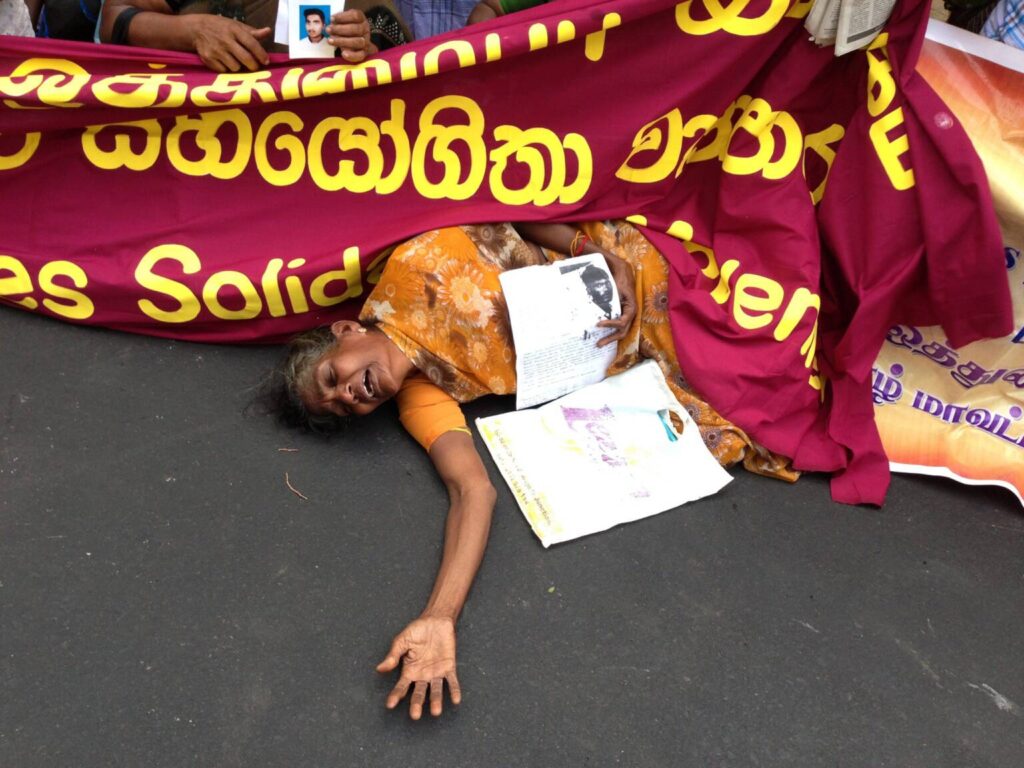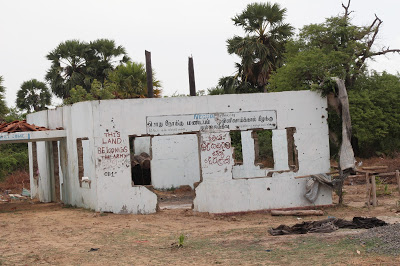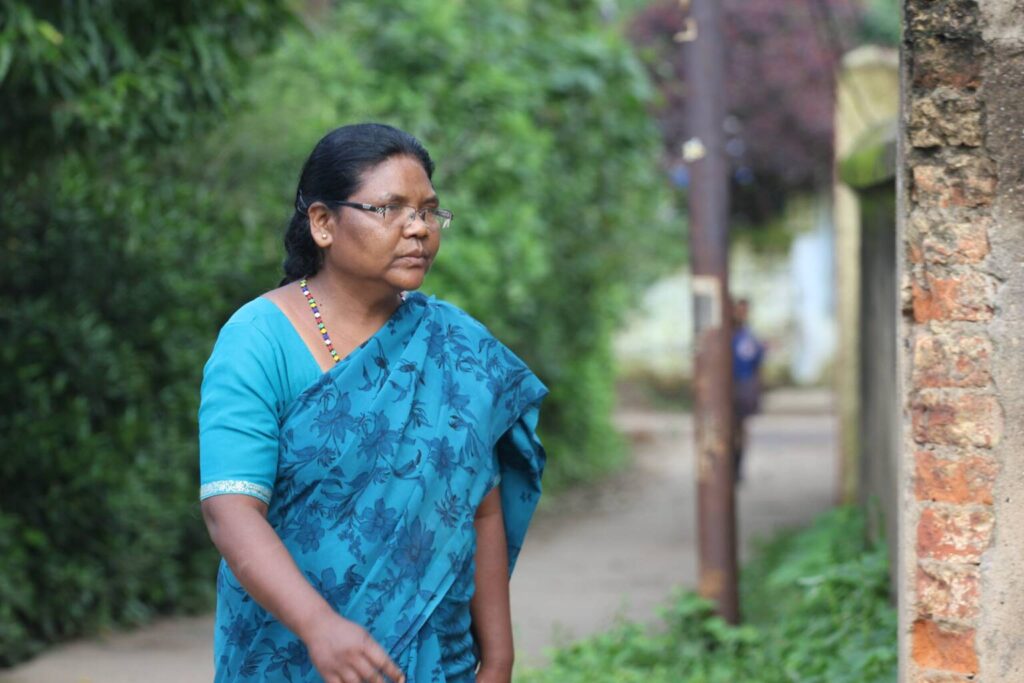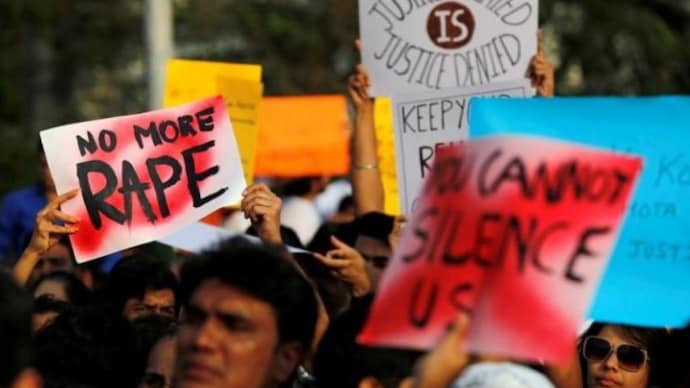The Unknown Fate Of Thousands In Sri Lanka
Link in Kafila
http://kafila.org/2013/09/02/the-unknown-fate-of-thousands-in-sri-lanka-leena-manimekalai/
Link in

https://www.colombotelegraph.com/index.php/the-unknown-fate-of-thousands-in-sri-lanka/
By Leena Manimekalai –

Leena Manimekalai
By the wayside: This wreath/ with no name attached /is for you/who has no grave/ As the place of earth/ which embraced you/ could not be found/this wreath was placed by the wayside/Forgive me/ for placing a memorial for you/ by the roadside
writes Basil Fernando about the memorial constructed by families of disappeared at Radoluwa Junction in Seeduwa, a town near the city of Negombo, Srilanka. When I visited the memorial with lingering faces of the disappeared, it signified an important attempt to keep the memories alive, a yearning to prevent recurrence of mass disappearances and seek justice on behalf of the victims of disappearances and their families. Sri Lanka which has a deep and complex history of political violence is struggling to redeem the past with a frozen present and a black hole future. Communal riots, political assassinations and ethnic conflict have been an element of the socio political landscape of this tear nation for more than a century. Two heads of State, dozen national political leaders and numerous regional and local politicians, journalists, activists and artists have been assassinated by groups representing virtually every shade of political spectrum. Srilankan State deploys disappearances and extra judicial killings as an instrument of public policy in the name of State Emergencies, Prevention of Terrorism Act, Dubbing of persons as terrorists, unpatriotic, enemies of state. Brutal suppressions of two armed insurrections in the Sinhala South in 1971-72, 1987-89 led by Peoples Liberation Front (JVP) and an armed Tamil Separatist Movement since 1970s led by the Liberation Tigers of Tamil Eelam(LTTE) in the Tamil North and East of the island had spotted Srilankan State guilty of horrific human rights abuses. Now the Nation is the world leader in number of disappeared crossing tens of thousands who have no date of death, no place of death, no body, and no grave or funeral rites. Obviously there is no shelling, no bombing in the island since 2009 and the State wants the world to believe that war is over but who will bring peace to the families who continue to lose their members to State Terror and also been denied their basic right to even open their mouth about the injustice.
What do you demand your government regarding your missing son? I asked Ilangairathinam of Iranapalai village near Mullivaickal, who is the mother of four children and whose elder son is missing since 2009. Her husband is paralysed by the shelling during the last phase of war in 2009 and she carries a piece of a bombshell in her chest, which is medically impossible to remove. Her daughter’s school got interrupted because of war and lack of finances did not let her continue. One of her son’s legs is amputated out of a shell attack and the other son is reportedly abnormal in his mental status, post war. Apparently the family lives in rambles with small maintenance money given by the government and the daily wages the mother is able to earn out of a cook’s job in the local school. She did not answer my question and gave me a cold look. I was clueless. My question might have been ridiculous in the hapless state she is currently in. Her son was forcefully recruited by LTTE in 2008 and sent to the warfront, where he ultimately surrendered to the army and there is no news after that. Mother is been searching all the detention camps and prisons and check posts and NGO offices and police stations and state offices since her family relocated to their village after the horrendous displacement route from Iranapalai to Mullivaickal to Nandhikadal and then to Vavuniya camps since December 2008 for almost a year. Did her smile indicate the terror she is still captivated with, that never left her even after all these years? Or did she think that asking the government for anything was a useless exercise? Or she has lost hope in anything and everything? Or she wondered what will bring her by sharing her story with me?
I have read about disappearances, forced abductions, white van stories, detentions, killing and torture and my knowledge about it is only through news reports, literature and articles. My visit to the monument of the disappeared started haunting me and I had a strong calling on knowing more about the stories behind the photographs. I wondered who want their loved ones to be a bronze or marble plaque at the end of the day. I had night mares about the trauma of mothers they would go through every day with all the wildest imaginations about their sons and daughters in camps and prisons or such dodgy places. I was intrigued to know how it is like for the families of the disappeared to lose a loved one under such horrendous circumstances. I wanted to know their fears, thoughts and their dreams of hope.
Vini, the mother of five children in Pesalai, Mannar sold the boat her husband had owned, to meet up with her emergency financial needs. She has no clues about why her husband was forcefully taken by Army in front of her eyes and whole family and people in the village being witness to it. She insists to show her, her husband and she doesn’t mind even if he is in prison undergoing the cruellest of punishments. She just wants to know if he is alive. She is struggling hard to save her sanity amidst newspaper reports about floating bodies of the disappeared down rivers, laid upon roads, burnt with tyres, exhibited beheaded in public, naked with bottles in their genitals and similar gruesome acts. Her children live with the barest of essentials and her inability to feed her children three meals is the most humiliating emotion she goes through. As the interview transpired, I could see how determined is she to have her husband alive in her memories and continue to believe that they will be reunited soon. Her eldest daughter showing symptoms of withdrawal and mental depression never leaves her room, while the second to elder most daughters has written notebooks of letters to her missing father. Vini has stopped her teenage son from school, fearing of any abduction. She comes across the navy officials who took his husband away, every day in her village sentry points but they neither reveal any news nor engage legal complaints.
While the fate of the highest leadership of LTTE who surrendered in the last phase of the war faced the worst war crimes by the army such as brutal mass murders , few of the second level leadership detained in prison are found missing while in custody. Worst affected are the low level LTTE cadres. Immediately after the war ended in May 2009, the government began announcing in the IDP camps that anyone who had spent “even a minute” with the LTTE should surrender themselves to the Army. Fearing that worse would happen to them if they refused to surrender and were found out later, 11,982 Tamils surrendered. These were the ones who underwent worst of torture, disappearances and extra judicial killings. I met mothers and sisters of some young people who were forcibly recruited and spent only a few days or months with the LTTE were arbitrarily detained and found missing or reported brutally dead later in the newspapers. There were several other stories of individuals disappearing who had no field participation, but had been forced to work for a few months in the kitchen or building bunkers who then surrendered to army. Mothers from Mannar to Mullaitheevu, the area boxed in 2009 for ethnic cleansing repeatedly told me that, when the government detains their sons and daughters who were low-level cadres while reintegrating some of the LTTE’s most prominent leadership, it serves as a double betrayal – first, by the LTTE who forced civilians to fight for them, and second, by the government who is punishing those very same civilians with lengthy detentions and sham trials.
Initially, I was worried about my whole attempt of meeting and interviewing people will be prying into painful memories. I was repeatedly cautioned that some of the families were wary of revealing information and sharing their story as they were still afraid. But I was moved by the warm welcome and smiles. I was offered tea and biscuits and it looked so alright with their welcoming gestures. But the moment, I started asking questions, there will be killing silence. Suddenly darkness creep in like it will swallow everyone and everything around. Then they will slowly unravel about their sleepless nights, mental agony and endless journeys in search of a son, daughter, husband, father or a brother. The heart wrenching voices I heard made me weep for hours and their tears swell in my memories. Though few of them openly admitted that having a heart pour helps their healing, I was awed by the sense of trust they develop with strangers like me while there is utter mistrust been built by the dirty war and aftermath, even with their own folks and neighbours. When a mother showed lungis and the purse of his son preserved in a box while they do not even have a roof to live under and when a mother shared with me how she still serves food in her daughter’s plate while serving meal to her family and when I met a father who became clinically obsessed with astrology spending all his time tracing his daughter, I could not stop myself shivering to the pages of deepest human emotions.
When I pursued with my questions on why religious and civil society leaders are silent about this human trial, I came to know that they met the same fate as that of the disappeared whenever they dared to speak out. Most of the affected do not know where to go and whom to ask justice when the State itself has given a free rein to the custodians of law to break the law. But still few of the families dared to appeal and fight their legal struggles. And they have their due of enforcement officials often visiting them, forcing them to accept death certificates and some paltry compensation. Families said they could not assess the value of their loved one in monetary terms and I met a mother who refused to accept certificate and money but demanded her right to the corpse of her son to fulfil the last rites. My understanding is disappearances caused by state sponsorship are the most difficult human right violation forms in getting redress. Impunity would be the order of the day when the State itself is involved in these heinous crimes.
My deepest experience is the day I spent with the mothers and fathers of the dead found in Mathalai Mass graves, discovered during last December(2012) with 115 bodies. Forensic reports declared that the bodies belong to the year 1989 to 1991. Families, searching for their wards who were believed disappearing for decades together, now appeal in the courts to find out if the mass graves had their sons or daughter’s dead bodies. As I had mentioned earlier, large scale mass murders were made in the late eighties and the disappearances were explained as a consequence of a civil conflict between a group of insurgents known as Janatha Vimukthi Peramuna(JVP) or People Liberation Front and the security forces. JVP was declared one of the instigators of the July 1983 riots against Tamils in the north(while the gravest 83 riots was a state sponsored pogram against Tamils) and is been forced underground and hunted down by what is called as State’s war against dissent. Irony is Sinhala JVP in the south and the Tamil LTTE in the north and east developed modes of brutal retaliations in terms of militancy. So, the State used it in its propaganda to disguise the extensive violence perpetrated by State in crushing them. And all the time, civilians were bombed, killed and butchered in the process. Fact is, in the name of dealing militancy, the Executive President of the State whoever held the position erased political opposition through the years with the help of draconian laws and military powers resulting in an unquestionable authoritarian regime. When I discussed with intellectuals who are still left alive in the island, they spared that the truth is in Lanka, there is no conceptual framework existing to resolve any of the major issues, including the issue of ethnicity. And looking for an isolated solution to the ethnic crisis is a constitutional illusion and the tragedy is that people paid in blood in life in history for such illusions.
The grim fact is number of disappearances in Lanka according to official records is nearing thirty thousands and out of this 15 percent are below the age of 19. Sadly many families today believe that the disappearances would continue in the island. The politicians, army officers and policemen who are responsible for the disappearances starting from 1980’s are still politicians with more power and the army officers and police now hold more powerful posts than the posts they held before. And the fear psyche still encompasses the landscape. War is still alive and kicking in the form of silencing and militarisation. Listening to stories of suffering, it is easy for anyone to lose hope in humanity. Families of the disappeared have remembered those no longer with them by seeking to reform a system rooted in violence, impunity and fear that robbed them forever of their loved ones. Their pain can never be erased but that’s the very important one to be transferred to the hearts of every decent citizen who can act against the State executing the gravest of crimes. At some stage national and international conscience, if there is such thing remaining, should prove capable of responding to their pain. I was in Jaffna when families of the disappeared gathered on July 27th behind Jaffna Library, craving Ms. Navi Pillai , the UN Human Rights High Commissioner’s attention. I was lost in tears and I felt my camera so powerless before the portraits of the missing mothers and fathers and sisters and brothers and sons and daughters, their beloved were holding as deepest wounds caught in between frames. Ms. Navi Pillay did not meet them in Jaffna but in Colombo subsequently on august 30th. I sighed when I heard her saying “It is important everyone realizes that, although the fighting is over, the suffering is not. I have been extremely moved by the profound trauma I have seen among the relatives of the missing and the dead, and the war survivors, in all the places I have visited, as well as by their resilience. Wounds will not heal and reconciliation will not happen, without respect for those who grieve, and remembrance for the tens of thousands of Tamils, Sinhalese, Muslims and others who have been missing in the battlefield, in buses, on the street, in detention, or by forced abduction”
*Leena Manimekalai – Filmmaker, Poet could be reached at leenamanimekalai@gmail.com
லெனின் விருது – தினமணி கட்டுரை
பார்வையாளர்களுக்கும் இந்த விருதில் பங்குண்டு!
By -யுகன்
சிறந்த ஆவணப்பட இயக்குநர்களுக்கான லெனின் விருதை ஒவ்வொரு ஆண்டும் ஆகஸ்ட் 15 அன்று கடந்த மூன்று ஆண்டுகளாக வழங்கி வருகின்றது “தமிழ்ஸ்டூடியோ இணைய அமைப்பு’. நான்காம் ஆண்டுக்கான லெனின் விருதை சமீபத்தில் ஆவணப்பட இயக்குநர் லீனா மணிமேகலைக்கு அளித்தனர். விழாவிலிருந்து சில துளிகள்:
“”ஆணாதிக்க சமூகத்தில் கடந்த பத்து ஆண்டுகளாக தான் தேர்ந்தெடுத்த துறையில் தொடர்ந்து இயங்கிக் கொண்டிருப்பவர் லீனா. விருதுக்கு அவரைத் தேர்ந்தெடுத்து அறிவித்த உடனேயே நிறைய மிரட்டல்கள், கண்டனங்கள் பரவலாக எங்களுக்கு வந்தன. அப்போதே எங்களுக்குத் தெரிந்துவிட்டது, நாங்கள் சரியான ஒருவரைத்தான் தேர்ந்தெடுத்திருக்கிறோம்…” என்றார் தமிழ் ஸ்டூடியோ இணைய தளத்தின் நிறுவனர் அருண்.
“”வெகுஜன ஊடகங்களாலும் பெரும்பாலானவர்களாலும் கொண்டாடப்படும் பிம்பங்களை தன்னுடைய “மாத்தம்மா’, “தேவதைகள்’ போன்ற ஆவணப்படங்களின் மூலம் லீனா தகர்த்திருக்கிறார். அருந்ததியர்கள் சமூகத்தினரிடையே இளம் சிறுமிகளுக்கு “பொட்டுகட்டி’ அவர்களை மாத்தம்மாக்களாக மாற்றும் விஷயத்தை தன்னுடைய ஆவணப்படத்தில் வெளிப்படுத்திய சமயத்தில், அவருக்கு பெரும் அச்சுறுத்தல் எழுந்தது. சட்டப்பூர்வமான எதிர்ப்புகள் கிளம்பின. அந்தச் சமயத்தில் “தினமணி’ வார இதழிலும் ஆவணப்படம் தொடர்பான ஆதரவான செய்திகள் வந்தன. நானும் கையில் கேமிராவை எடுத்துக் கொண்டு, அருந்ததியர்கள் வாழும் பகுதிக்குச் சென்றேன். நேரிடையாகவே அந்த மக்களிடம் பேசினேன். அந்த சமூகத்தில் மாத்தம்மாக்கள் இருந்ததை உறுதிசெய்துகொண்டேன். அதேபோல்தான், “தேவதைகள்’ ஆவணப்படமும் அதிர்ச்சி அளிக்கக்கூடியது. சமூகத்தில் இப்படிப்பட்ட பணிகளைச் செய்யும் பெண்களும் இருக்கிறார்கள் என்பதை தன்னுடைய ஆவணப்படத்தின் மூலம் காட்டியவர் லீனா மணிமேகலை…” என்றார் சிவகாமி ஐ.ஏ.எஸ்.
இயக்குநர் பாலாஜி சக்திவேல், “”போராட்ட உணர்வோடு கடந்த பத்து ஆண்டுகளுக்கும் மேலாக ஆவணப்படவுலகில் செயல்பட்டுக் கொண்டிருக்கும் லீனா மணிமேகலையின் பல படங்களும் அதிர்வை உண்டாக்கும் படங்கள். அவருக்கு என் பாராட்டுகள்..” என்றார்.
“”நானும் தீக்குச்சி. அவரும் தீக்குச்சி. எங்களுக்குள் நிறைய சண்டைகள் வரும். சமாதானங்களும் உடனுக்குடன் ஏற்படும். என்னை பாசமாக “அப்பா’ என்று கூப்பிடும் பெண் லீனா மணிமேகலை. அவரின் சமீபத்திய ஓர் ஆவணப்படத்தைப் பார்த்தேன். இரண்டு, மூன்று முறை பார்த்திருப்பேன். அதிலிருந்து எனக்கு ஒன்றும் புரியவில்லை. புரியவில்லை என்பது என்னுடைய குறையே தவிர, அவருடைய குறை என்று கூறமாட்டேன். சங்க இலக்கியங்களில் சில பாடல்களை இன்னமும் பொருள் அறிந்து படிப்பதில் எனக்கு சிக்கல் இருக்கத்தான் செய்கிறது. அது என்னுடைய குறைதானே! லீனா அந்த ஆவணப்படத்தில் ஒரு நவீன ஓவியம் போன்ற ஒரு முயற்சியைச் செய்திருக்கிறார் என்று நினைக்கிறேன்… இன்னமும் மூன்று நான்கு முறை பார்த்தால் ஒருவேளை அந்தப் படம் புரியும் என்று நினைக்கிறேன்…” என்று லீனாவை மனம் திறந்து பாராட்டினார் இயக்குநர் பாலுமகேந்திரா, அதோடு விட்டிருக்கலாம். “”நம்முடைய தமிழ்த் தாய் வாழ்த்திலும் கூட, “எத்திசையும் புகழ்மணக்க இருந்த பெறும் தமிழ் அணங்கே…’ “அதென்ன இருந்த’ அப்படியென்றால் இப்போது இல்லையா? எனக்குப் புரியவில்லை!” என்றார்.
இறுதியாக ஏற்புரை நிகழ்த்திய லீனா மணிமேகலை சற்று உணர்ச்சிவசப்பட்டு பேசினார். “”நான் அடிப்படையில் ஒரு பொறியியல் பட்டதாரி. அது தொடர்பான பணியையும் சிறிது காலம் பார்த்துவந்தேன். சமூகத்தில் நிலவும் ஆணாதிக்க மனப்பான்மை, வெகுஜன ஊடகங்களால் காட்டப்படும் பொய்யான பிம்பங்கள் இவற்றை எல்லாம் உடைக்கும் அல்லது மறுக்கும் ஆயுதமாகத்தான் நான் ஆவணப்படங்களைக் கையில் எடுத்தேன். யோசித்துப் பார்த்தால் என்னுடைய பிடிவாதம்தான் என்னை இந்த அளவுக்குக் கொண்டுவந்திருக்கிறது. ஆனால் இதற்காக நான் கொடுத்த விலை அதிகம். குடும்பத்தினருடன் தொடங்கி நிறைய பேர்களின் எதிர்ப்பை சம்பாதித்தேன். அன்பு, காதல், நட்பு என நிறைய பிரிவுகளைச் சந்தித்தேன். என்ன செய்தாவது என்னுடைய ஆவணப்படங்களை தொடர்ந்து வெளியிட்டுவந்தேன். ஆவணப்படங்களை திரையிடுவதற்கே இடம் இல்லாத நாட்கள் அவை. ஆவணப்படங்களை திரையிடுவதில் தொடங்கி ஆவணப்படங்களை எடுப்பவர்களுக்கு விருதும் வழங்கி கெüரவிக்கும் தமிழ் ஸ்டூடியோ அமைப்புக்கு என் நெஞ்சார்ந்த நன்றிகள். நிறைய பழைய நண்பர்களை இங்கே சந்திக்கமுடிந்தது.
என்னுடைய ஆவணப்படங்களில் பங்காற்றியவர்கள் அதில் தோன்றியவர்கள்… அவ்வளவு ஏன்… என்னுடைய ஆவணப்படங்களைப் பார்த்த பார்வையாளர்கள் அனைவருக்கும் கூட எனக்குக் கிடைத்த இந்த விருதில் பங்கிருக்கிறது. எல்லாருக்குமான விருதாகத்தான் இந்த விருதைப் பார்க்கிறேன். இந்த விருது என்னுடைய போராட்ட குணத்தை இன்னும் தீவிரமாக்கும்…” என்றார் ஆனந்தக் கண்ணீருடன் லீனா மணிமேகலை!
Literary Post-mortem in Jaffna: Ploughing the Wounds of Conflict
Sanitized version of my article below in “The Hindu”
http://www.thehindu.com/features/metroplus/events/let-the-healing-begin/article5006799.ece
“Absent, I come to the home of the absent “ – Poet Mahmoud Darwish
Traveling on A9 highway connecting rest of Srilanka to Jaffna Peninsula, the former rebel runway, now reconstructed as carpet road which shines as Chinese currency running parallel to the new railway track that is an Indian “work in progress” can make your ride feel nails in the air.
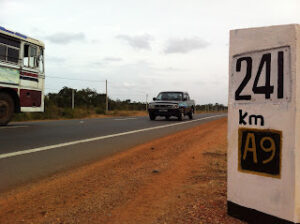
Even my Sinhalese friend who drove me to Jaffna was embarrassed by the distasteful hoardings of Rajapakshe grandiosely propagating development schemes like “Vadikkil Vasantham ; Kizhakkil Udhayam” (Spring in North ; Sunrise in East).
The shrub jungles on both sides of the road were clothed in military green with the Srilankan Army having a strong presence here. The green did little to calm our senses as nothing could hide the sight hide the plain sight of a disabled man passing the street or a forlorn lady with cotton wool draped over eyes, cradling a paralysed child in her arms. What is even distressing is that people wait in woe for alms from anyone who looks tourist or “NGO”ised. Strange block homes are cropping all the way like mushrooms after a quick rain.
Shrouding over this dreary picture are the ultra-Buddhist nationalist motifs, more so the stark reality of their omnipresence. A series of check-posts at points such as Omanthai, Elephant pass as true memoirs of a war, simply refuses us to break from the past.
When I made my trip to Jaffna for the 41st Ilakiya Santhippu(Literary Meet / July 20, 21) official in my facebook page, several trolls (those overtly fond of sowing discord in the virtual world!) alleged that I was a stooge of Rajapakshe. A visit to a country whose government looks at a mere television remote controller as a serious threat to its sovereignty could spell horror to any free-thinking person. However this time around, with boycotts bearing eerie resemblance to State Censorship.
Thinking along those lines, I sometimes wonder how nationalistic I can feel about holding Indian citizenship considering the human rights excesses committed by the Indian State in Kashmir and North East. Sometimes the whole debate on who has less blood in their hands can be quite insinuating.
All the early forty editions of “Ilakiya Santhippu” were organised in European cities and Canada by exiled writers and artists during the last thirty darkened years of unscrupulous censorship by both State and Liberation Tigers for Tamil Eelam(LTTE) in the island. Authoritarianism on both sides had extracted a heavy human toll since dissidence was always considered as treachery in the tragic war. Writers, artists and activists who held opinions different than that of the dominant one in vogue were viewed as traitors and were killed in broad daylight starting with Rajini Thiranagama (Author of Broken Palmyrah). Infact Ilakiya Santhippu had one of its frontier writer / thinker Sabalingam brutally murdered in France and they had to dedicate the following edition to “Writers who were killed and also who are likely to be killed”. Thus the conscience of the expatriate free thinkers kept ticking in the form of Ilakiya Santhippu , as small magazines and radical publications, refused to be “silenced” which was viewed as yet another form of death. I recall what our late Edward Said quoted as to “pit the power of culture against the culture of power”

There was another argument that what would Ilakiya Santhippu bring to the thousands of poor and the displaced, the bereft and victims of Srilanka’s war. But should art relinquish after a defeat? Can fear preoccupy the space for dialogue? If so, how and who will engage with the political polemics? Is it possible to escape a post-mortem of war crimes and severe loss of civilian lives? Who is a writer then? What is the role of writers and artists in the time of crisis and social upheavals? When people’s identities have been destroyed individually and culturally and in the process of destruction, how and who will voice the conflict? Can literary production heal the trauma? I believe that these questions have to be kept alive even if we do not have immediate answers.
Young Poet Vijayaletchumi, in one of the poetry sessions at Ilakiya Santhippu, read “Photographs/ hang in all houses amidst /joss sticks smoke/ and floral offerings/ of village youths/ eclipsing the portraits of gods (Poem “Paled East”)” Her lines mourn every Tamil household for their loss of family members, and pride. In this given situation, we need to reflect on what oft-uttered words such as reconciliation, progress, development and importantly, that most cherished or abhorred word ‘nation’ mean amidst all the suffering and loss of lives.
Sessions on caste, gender, transgender and sexual minorities, nationalist and critical of nationalist literature of North / East Tamils, writings of Malayaga(hill country) Tamils and Tamil-Muslim nationalists, secular Sinhalese; Diaspora literature, traditional art and folklore with speakers from the respective regions and ethnicities signified the aspirations of a war ravaged community to build a civil space for a plural and an open discourse.
The literary community, however, also struggles to locate an inclusive Srilankan Imaginary, where the majoritarian Sinhala polity triumphantly declares that minorities no longer exist in post war Srilanka.
Nationalism, as collective consciousness in times of crisis of exclusion held the community together and aided the abundance of literary production but also constructed the ‘other’ as an enemy and divided. Divided humanity subsequently made women, the socially underprivileged by caste/ class and sexual minorities even more marginalized. Sinhala Buddhist Nationalism and its oppression tactics evolved Tamil Nationalism while the violent extremities of Tamil Nationalism led to the formation of Muslim Tamil Nationalism. Added to it, the caste dynamics of Northern Tamil psyche further excluded Hill country Tamils to emerge Hill Country Tamil Nationalism. Artists became refugees and refugees became artists because of political pressures and crisis in cultural identity creating exile literature. Hence literature in Srilanka is deeply polarized reflecting the deep divide between ethnic communities.
There was always literature production which on one hand promoted ideologies of ethnicity, nationalism and violence and on the other hand critiqued the notions of nationalism and called for meaningful inquiry into human dignity and values. This contrast between the ideal and real evidently epitomized Ilakiya Santhippu and “Guernica” – the 800 odd pages Literary Journal edited by writer Shobasakthi and team with contributions from 12 countries, which was released in the meet. “Guernica” indeed was a reflection on the longing for humanistic ideals after decades of trial, error and trauma.
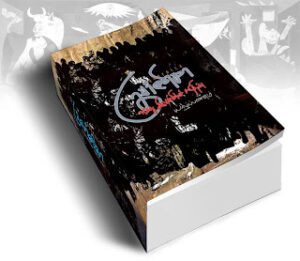
Sinhala Novelist Liyanage Amarakeerthi while discussing Tamil Characters in Sinhala criticised that they just use them to push the meanings forward. He pointed out the fragile sense of guilt within Sinhala writers community with examples from Writer Jayathilaka Kammellaweera’s short stories “Poy Solla Vendam(Need not lie)” and “Are you alright?” He remarked about how Sinhala writers are generous enough to share love with Tamils but not the State.
Writer-Translator So.Padmanathan, who chaired the session, shared his dilemma in translating Poet Nufman’s resistance poem about burning of Jaffna Library. With his deepest respect and love of Buddha, he could not translate “Butharin Padukolai” as “Buddha’s Assassination” and had to give a title “Murder”. Poet Sumathy Sivamohan discussed about how to generate meanings outside of a poem’s immediate site of writing. She spoke about one of the prolific Poet Sivaramani who killed herself in 1991 after burning cinders from of her poetry. Sumathy Sivamohan recited the violence that mournfully leapt out of Sivaramani’s untitled poem “When a gun is pointed/at the umbilical cord/of this society/the dream of a butterfly/that can balance itself/on a thin flower bud/is only an incident/that I cannot relate to/ I, in my effort to live as human/prefer to leave the flowers to the tree”; she stated that this was not merely symbolic but about a real gun that belongs to LTTE.
Writer Lenin Mathivanam proclaimed “Malayaga(Hill Country)” Tamils who were brought by British to work in tea estates are the first and foremost to write Diaspora Literature. He observed the hill country Poet Meenatchi’s as the pioneering voice against the repressive Sinhala Buddhist regime. Nawaz Soubi while presenting his research on Tamil Literary Histories compiled so far, proved with evidence on how the anthologists neglected “Asanbe Sarithiram” though being the first novel written by a Tamil Muslim.
Veteran Writer Theniyaan, in his sessions on Dalit Literature briefly described the repertoire of Novelist Daniel and discerned how LTTE silenced Dalit-related issues and never committed on the abolition of caste. Dalit sentiments were stronger in questioning their place and dignity in “Eelam”, the separate Tamil homeland being fought for all these years.
Writer Activist Chithralekha described how Tamil women were free to have a gun but not free to write on sexuality, religion and critical politics. Rape culture by hegemonic Sinhala State, Indian Peace Keeping Force and within Armed Movements might be hid in the pages of history but not in the pages of women literature. Poems like Koneeswarigal by Kala and Krishanthy by Vinodhini give us ‘her’ stories. Transgender Writer Activist Living Smile Vidya , a participant from India presented a historical session on transgender life and literature to a community where even “coming out” of sexual minorities cannot be construed as reality. Debates went to new heights when audience recalled how LTTE killed transgender people in the name of punishment since prostitution was considered criminal in their political constitution. Writer Stalin from France traced the history of Diaspora literature since during 80s when the refugee phenomenon started and it sounded more like a murder mystery as he revealed how writers and thinkers gave their life to the “traitor” culture. War had displaced hundreds and thousands of Tamils internally and externally and that had a direct impact on literary production in Tamil.
After drenching myself in the literary floods of a stark and oppressed culture,
I found myself asking, can freedom be possible at the cost of humanity? In fact it was a question that resonated in the mind of every literary enthusiast, writer, journalist, poet and artist from Tamil, Muslim and Sinhalese communities across the Island and from India, Canada, Germany, France, United Kingdom and America who gathered in Jaffna for this literary meet.
I must say, everyone had given whatever they could to come to terms with the despair of defeat.
Leena Manimekalai
Poet – Filmmaker
A Ballad of Resistance: An evening with feminist film-maker, Leena Manimekalai
Links : http://womensearthalliance.blogspot.in/2013/06/a-ballad-of-resistance-evening-with.html
By Lauren Bellenie, WEA General Intern
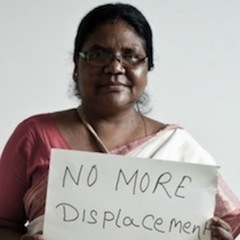
Dayamani Barla was jailed last year to silence her anti-displacement activism.
On June 18th, friends of WEA, old and new, trickled into the David Brower Center to meet a special guest speaker, Indian social justice film-maker, poet and actress, Leena Manimekalai. Rucha Chitnis, WEA’s South Asia Program Director, welcomed everyone to the event and shared how indigenous women were on the frontlines of global resistance against landgrabs that threatened their ancestral homelands, and how films, such as Leena’s “Ballad of Resistance”, are an important vehicle to highlight the crucial role women play in social movements and defending human rights.
Guest speaker, Preeti Mangala Sekar, ED of Narika, read a poem written by Leena called “Penalty.” The poem framed the public response to Leena’s poetry, including demands from some right wing voices, who shunned it as “pornographic” writing. The poem’s content highlighted the feelings and situations that arise when the only path to follow is one that is honest, yet perceived by some as inflammatory because it expresses and asserts female sexuality and power. Leena relates to this through her own unconventional life path and through the stories of human rights activists, especially women, that she documents in her films.

Leena sharing about her personal journey as a feminist film-maker
Leena screened “Ballad of Resistance”, which follows Dayamani Barla, India’s first indigenous female journalist from Jharkhand, who has centered her life on protecting ancestral lands occupied by tribal communities in her state. “Ballad of Resistance” offers a breath-taking view into the longterm social action against the external pressures of development facing indigenous communities in India. The film shows how Dayamani works tirelessly at the grassroots, documenting the struggle through her journalism and efforts to organize tribal communities to stand strong against corporate landgrabs for mining and other industrial development projects.
Dayamani explains in the film that the Munda tribe has been resilient to many attempted impositions over the years. She notes that this area represented resistance against British colonizers, long before the time of Gandhi. Though the fights have not always been easy, their persistence has afforded them their land rights on multiple occasions. Today, women are on the frontlines of these movements against land grabs from powerful forces. One moving scene in the film showed women from Nagri communities tearing down walls of government-santioned construction sites to make way for business and law schools, despite police presence. The women featured in the film echoed the sentiment, “We will give our lives but not our land.” Dayamani stands for the dignity, rights and identity of her community and the ancestry that constitutes the foundation for their relationship with “Mother Nature”.

Anu Mandavilli introduces Leena
Throughout the evening, the audience gained fascinating insights into Leena’s own life as a feminist artist and activist. During the question and answer portion, Leena shared how she began making films to document lives of people, who are left out of mainstream media and development processes. She explained that she would go to communities and document their story of oppression, and then the oppressors of that group would also want her to document their story as well.
Leena’s films are creative and effective means to highlight human rights violations, as well as the agency of local communities to demand justice and dignity. When Dayamani was arrested in 2012 for two and a half months, supporters used Leena’s film as a means to raise awareness to free her. Attendees were so engaged in the discussion with Leena that it continued well past the scheduled finish time.
Leena closed with a statement about our role in these issues as international allies. She encouraged our role as funders, given the sparse monetary sources available for NGOs and social movements in India and profoundly stated that “Indian resistance is at a challenging point, but we can give them hope and solidarity that they are not alone.”
Special thanks to activist, Anu Mandavilli and Friends of South Asia for partnering with WEA to host this gathering.
அச்சம் தவிர். ஆண்மை இகழ்
நன்றி – அந்திமழை மாத இதழ்
01/01/2013
சென்ற வாரம் டெல்லியில், இருபத்து மூன்று வயது பெண் மாணவி மீது, ஓடும் பேருந்தில் நடத்தப்பட்ட காட்டுமிராண்டித்தனமான தாக்குதலைப் பெயரிட தமிழில் ஒரு சொல்லைத் தேடிக்கொண்டிருக்கிறேன். தமிழில் எழுதும் சிந்திக்கும் பெண்ணுயிரான எனக்கு இது ஒரு அவமானகரமான தருணம். என் முன்னே குவிந்திருக்கும் தினசரி செய்திகளிலும், கட்டுரைகளிலும் பயன்படுத்தப்பட்டிருக்கும் “கற்பழிப்பு” என்ற வார்த்தை என் முகத்தில் அமிலத்தை எறிகிறது. கற்பழிப்பு என்பதை பகுபதப்படுத்தினால் ஒரு ஆணுக்கு அல்லது குடும்பத்திற்கு அல்லது சமூகத்திற்கு அடிமையாக இருக்கும் தகுதியை இழப்பது என்ற அர்த்தம் வருகிறதென்கிறார் தந்தை பெரியார். தமிழில் வள்ளுவம் தொடங்கி தினத்தந்தி வரை ”கற்பழிப்பு” என்ற சொல் வழக்கில் இருக்கிறது என்பதை சிந்தித்துப் பார்த்தாலே தமிழ்ச்சமூகம் இன்னும் எப்படி ஆணாதிக்க, நிலபிரபுத்துவ சாக்கடையில் சிக்கியிருக்கிறது என்பதை புரிந்துக்கொள்ளலாம். ”வன்புணர்ச்சி”, ”வல்லுறவு”, ”வல்லாங்கு” என்ற தமிழ்ப்பதங்களும் பெண்ணுக்கு இழைக்கப்படும் உச்சபட்சக் கொடுமையை அர்த்தப்படுத்தத் திணறுகின்றன. ”பாலியல் சித்ரவதை” என்ற சொல் மொழியை சற்று தன் அதிகாரத்திலிருந்து கீழிறங்கி பெண்ணுக்கு சற்று அருகே நிற்க வைக்கின்றது.
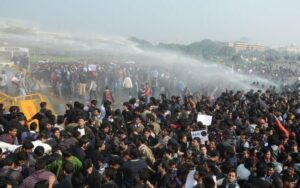
இன்னும் உயிருக்குப்போராடிக் கொண்டிருக்கும் பலாத்காரத்தால் சிதைக்கப்பட்ட அந்த மாணவிக்காக டில்லியை ஸ்தம்பிக்க வைத்த ஆயிரக்கணக்கான மாணவர்களோடும் மாணவிகளோடும் நானும் கை கோர்க்கிறேன். பாலியல் குற்றங்களுக்காகத் தண்டிக்கப்பட்ட எம்.எல்.ஏக்களையும், எம்.பிக்களையும் கொண்ட அரசாங்கமும் அதன் போலீஸ் குண்டர்களும் ஏவும் கண்ணீர் மற்றும் புகை குண்டுகளையும், லத்தி அடிகளையும் மீறி சமூக நீதி கேட்டு இந்த மாணவர்களோடு அணி சேர்கிறேன். ஆனால் கூடவே சாதியின் பெயரால் தலித் பெண்களுக்கு இழைக்கப்படும் பாலியல் கொடுமைகளுக்கு எதிராக, குடும்ப உறவுகளில் -திருமணங்களில் நடக்கும் வல்லுறவுகளுக்கு எதிராக, மதவெறிக் கும்பல் ஒவ்வொரு கலவரத்திலும் பெண்களைக் குறிவைக்கும் ஈனத்தனத்திற்கெதிராக, ஆதிவாசிப் பெண்களை மானபங்கப்படுத்தும் “வளர்ச்சி”த் திட்டங்களுக்கெதிராக, தேசப்பாதுகாப்பு என்ற போர்வையில் ஈழத்திலும், காஷ்மீரத்திலும், வட கிழக்கிலும், நடந்துக்கொண்டிருக்கும் பாலியல் பலாத்காரங்களுக்கெதிராக, சீருடை காமுகர்களுக்கெதிராக அணிசேரவும் இதே மாணவர்களை வலியுறுத்துவேன். அரசாங்கத்தை கிஞ்சித்தும் அசைத்துவிட முடியாத 9 டூ 6 உண்ணாநிலைப் போராட்டங்கள், வெறும் சடங்காக மாறிப்போன கடையடைப்புகள், அடையாள அட்டை பகிஷ்கரிப்புகள் போன்ற காலாவதி எதிர்ப்பு முறைகளைத் தவிர்த்து, அதிகாரத்தை அம்மணமாக்கும் போராட்டங்களை சிந்தித்து சாத்தியப்படுத்துமாறு கேட்டுக் கொள்வேன். இந்திய தேசம் ஏ.டி.எம் மெசின்கள் இயக்கும் வெறும் மத்தியதர வர்க்கத்தினரால் ஆனதல்ல என்று அவர்களின் மனசாட்சியை உறுத்துவேன்.
ஒரு வாரமாக சமூக வலைத்தளங்களும், இ மெயில்களும் ஆன்லைன் பெட்டிஷன்களால் நிறைந்திருக்கின்றன. குற்றவாளிகளுக்கு தூக்கு தண்டனையையும், ஆணுறுப்பு அறுப்பையும் வலியுறுத்தி கையெழுத்துக் கேட்கின்றன. கையெழுத்துப் போடாதவர்களை குற்றவாளிகளாக்கி விடும் வேகத்தில் குவியும் இந்தப் பெட்டிஷன்கள் சமூக உணர்வையும் சந்தைப்படுத்தி விட்ட இந்தக் காலகட்டத்தின் அவமானச் சான்றுகள். மனித சமூகம் ”அதிகாரம்” என்ற போதையைக் கண்டுபிடித்த போது தூக்கு தண்டனையையும் கூடவே கண்டுபிடிக்கிறது. குற்றவாளியைத் தூக்கிலிடும்போது ஒரு போதும் குற்றம் சாவதில்லை என்ற உண்மையை அதிகாரம் என்ற போதையைக் கலைத்தால் மட்டுமே உணரமுடியும். ”ஆணுறுப்பு அறுத்தல்” என்ற தண்டனைமுறை கோருபவர்கள் பெண்ணுறுப்பில் நுழையும் போத்தல்களையும், இரும்புக் கம்பிகளையும், துப்பாக்கிகளையும், என்ன செய்யப்போகிறார்கள். மேலும் ”பாலியல் சித்ரவதை”யை வெறும் பெண்ணுறுப்பில் நுழையும் ஆணுறுப்பு என்பதாக மட்டும் புரிந்துக்கொள்வது எத்தனை ஆபத்தானது. திருநங்கைகளையும், திருநம்பிகளையும், ஒரு பாலீர்ப்பு கொண்டவர்களையும் “திருத்துவதற்கு” பலாத்காரத்தைப் பயன்படுத்தும் குற்றங்களை எவ்வகைப்படுத்துவது? தன் உடையை, துணையை, வேலையை, கொள்கையை, நம்பிக்கைகளை, பாலினத்தை தேர்வு செய்யும் பெண்ணுக்கு ”பாடம் புகட்டுதல்”, ”அகெளரவப்படுத்துதல்”, ”தண்டித்தல்”, “துன்புறுத்துதல்” என்ற பெயரில் நடக்கும் பாலியல் அத்துமீறல்களை பண்பாட்டு ரீதியாக அனுமதிக்கும் மோசமான மனோபாவத்தின் வெளிப்பாடாக “ஆணுறுப்பு” சுற்றி எழுப்பபடும் தண்டனை கோஷங்களைப் பார்க்கிறேன்.
நடைமுறையில் இருக்கும் பாலியல் குற்றங்களுக்கான தண்டனைகளைச் சரியாகவும், விரைவாகவும், அறத்துடனும் பயன்படுத்துவதற்கு காவல் துறையும், நீதி துறையும் தயாராக இருக்கிறதா என்பது தான் நம்முன் நிற்கும் தீர்க்கமான கேள்வி. இதை எழுதிக்கொண்டிருக்கும் போது, நான் வாசிக்க நேர்ந்த செய்தி, நாகை மாவட்டம் தலைஞாயிறு பகுதியைச் சேர்ந்த 11 வயது சிறுமி பாலியல் சித்ரவதைக்கு உட்படுத்தப்பட்டது தொடர்பாகக் காவல்துறையினர் இந்திய குற்றவியல் சட்டத்தின் 450 (குற்ற நோக்கத்துடன் வீட்டுக்குள் அத்துதுமீறிப் புகுதல்). 376 (வன்புணர்ச்சி) ஆகிய பிரிவுகளின் கீழ் வழக்குப் பதிவு செய்திருக்கின்றனர். இந்திய குற்றவியல் சட்டத்தில் குழந்தைகளைக் கையாள்வதற்கேற்ற விதிகள் இல்லை என்பதாலேயே, பாலியல் குற்றங்களிலிருந்து குழந்தைகளைப் பாதுகாப்பதற்கான சட்டம் நவம்பர் மாதத்திலிருந்து நடைமுறைக்குக் கொண்டுவரப்பட்டிருக்கிறது. இந்த சிறப்புச் சட்டத்தின்படி, குற்றம் சாட்டப்பட்டவர்கள்தான் தாங்கள் குற்றம் செய்யவில்லை என்பதை நிரூபித்தாக வேண்டும். பாதிக்கப்பட்ட குழந்தையின் மருத்துவச் செலவு, வழக்குச் செலவு அனைத்தையும் அரசாங்கமே ஏற்க வேண்டும். அது மட்டுமல்ல. இந்த சட்டத்தின் கீழ் ஒவ்வொரு காவல் நிலையத்திலும் குழந்தை நல அலுவலர் இருக்க வேண்டும். ஆனால் இது எதுவுமே தலைஞாயிறில் நடக்கவில்லை என்பது தான் அவலம். காவலர், வழக்கை சிறப்புச் சட்டத்தின் கீழ் பதிவு செய்யாமல் வழக்கமான சட்டத்தின் கீழ் பதிவு செய்திருக்கிறார். சட்டம் தெரியாத காவல் அதிகாரிகளுக்கும், புகார் கொடுக்க வரும் பெண்களிடம் அத்துமீறும், பெண் சிறைக்கைதிகளைச் சூறையாடும் காவல் துறைக்கும் தான் நம் வரிப்பணம் சம்பளமாகத் தரப்படுகின்றது என்ற நிலையில் நீதிக்கான உரிமைக்குரலை எங்கு தொடங்குவது? எதில் முடிப்பது?
பாதிக்கப்பட்ட பெண்களை மேலும் அச்சுறுத்தும் குடும்ப, சமூக, அமைப்புகள், சுதந்திரத்திற்கான விலையாக மானத்தையே கேட்கின்றன. போரில் இறந்தவர்களின் எண்ணிக்கையைவிட குடும்ப வன்முறையில் இறந்த பெண்களின் எண்ணிக்கை அதிகமென ஒரு புள்ளிவிவரத்தை எளிதாக யாரும் கடந்துவிடமுடியாது. நாம் ஒவ்வொருவரும் ஒரு பெண்ணை இரண்டு முலைகள் – ஒரு யோனி கொண்ட பண்டமாகப் பார்ப்பதை கைவிடும்போதும், கருவுற்றிருக்கும் பெண்ணை ஸ்கேன் செண்டருக்கு அழைத்து செல்லாமல் இருக்கும்போதும், பிறக்கும் பெண்ணுக்கும், ஆணுக்கும் சரிவிகித வாய்ப்புகளையும் உரிமைகளையும் பெற்றோர் வழங்கும்போதும், வரதட்சிணை மாதிரியான இழிவுகள் முற்றிலுமாக ஒழியும்போதும், எப்பாலினராக இருந்தாலும் உழைப்புக்கேற்ற ஊதியம் சமமாக வழங்கப்படும்போதும், பாலியல் சுதந்திரம் பெண்ணுக்கான சுதந்திரமாகவும் கருதப்படும்போதும், ”மறுப்பு” சொல்லும் பெண்ணிடம் இருந்து மரியாதையாக விலகிச்செல்லும் மனப்பான்மையைப் பயிற்சி செய்யும் உறுதியை எடுக்கும்போதும், பால்-பாலின இழிவை வியாபாரமாக்கும் ஊடகங்களை கண்டித்து தனிமைப்படுத்தும் போதும், பெண்ணிற்கெதிரான அநீதிகள் ஒவ்வொன்றுக்கும் பெண்ணையே பொறுப்பாக்கும் அயோக்கியத்தனத்திலிருந்து விழித்தெழும்போதும் மட்டுமே காலகாலத்திற்கும் நடந்துவரும் பெண்ணுக்கெதிரான இந்த அதிகாரத்தின் போரை தடுத்து நிறுத்த முடியும்.
லீனா மணிமேகலை

